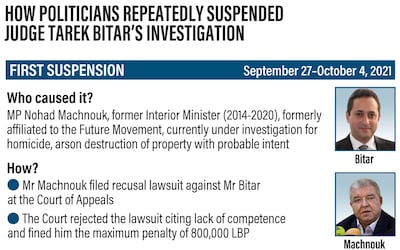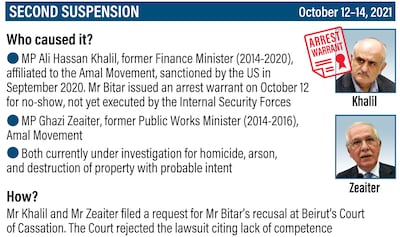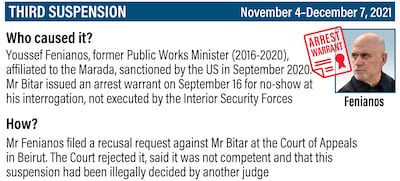A dozen high school pupils gathered outside the French embassy in Beirut on Friday to ask for international support in investigating the devastating Beirut port blast that killed their friend, Elias El Khoury, and at least 215 others a year and a half ago as the local probe flounders.
Mireille El Khoury, mother of 15-year-old blast victim Elias, also delivered a letter asking that France support a proposal from the families of victims that an international fact-finding mission be discussed at the next UN Human Rights Council Session, scheduled to start on February 28.
“President Macron was one of the first to come to Lebanon and express his support,” she told The National. “We are starting with France but we’ll visit other embassies.”
Youmna Rouhana, 17, read out a letter to France’s ambassador to Lebanon, Anne Grillo, who did not receive Ms El Khoury on Friday.
“We urgently need an independent, impartial and transparent investigation and we ask the UN Human Rights Council to set up an international fact-finding mission,” said Ms Rouhana. “Please, do not bury the truth with Elias and do not bury our hopes.”
One of the many faces of the tragedy that struck Lebanon on August, 4, 2020, Elias succumbed to his wounds two weeks after the explosion. His friends previously told The National that the music-loving teenager hoped to become an architect like his father. Music-streaming service Anghami posthumously released two of his songs.
“We can’t not have him with us and not know why he went away,” Cindy Nader, 17, told The National on Friday. “We want these answers right now.”
The gathering was attended by a handful of others affected by the blast.
“We hope that an international investigation can work in parallel to the local one,” said Tania Alam, a 52-year old lawyer.
Her husband, Jean-Frederic Alam, 57, had accompanied her to a doctor’s appointment the port’s vicinity on the day of the explosion. She was wounded. He was hit in the neck by flying debris and died in her arms.
“What’s terrible with this crime is the lack of justice,” said Mrs Alam.




Several reports show that the country’s leaders, from ministers to security agency directors, willfully ignored the dangers posed by the unsafe storage of thousands of tonnes of ammonium nitrate in Beirut’s port for seven years. Politicians have since blamed each other for not acting despite warnings.
Rights groups have supported victims’ calls for a UN fact-finding mission in view of the obstacles faced by local investigative judge Tarek Bitar.
His investigation has been paused for the fourth time since December 23 following attempts by politicians suspected of playing a role in the blast to remove him.
“The Lebanese judiciary has proven again and again that it’s either incapable or unwilling to hold powerful Lebanese leaders to account,” said Aya Majzoub, Lebanon and Bahrain researcher at Human Rights Watch.
“In the year and a half since the blast, we have unfortunately seen politicians file arbitrary lawsuits to suspend the investigation. We and the families of victims have lost trust in the domestic process which is why we are calling for a UN fact-finding mission.”
The mission would look into whether the Lebanese state has violated victims’ right to life and would not aim to establish criminal individual responsibility, said Ms Majzoub.
Information collected would be sent to the domestic judiciary in Lebanon and other countries with open cases on the issue, such as Germany and France, for their own criminal prosecutions to establish the events leading up to the blast.
Mr Bitar issued two arrest warrants, one in September and one in October, which have not been executed.
The head of the Internal Security Forces, Maj Gen Imad Othman, has claimed that he cannot arrest former finance minister and MP Ali Hassan Khalil because he is covered by parliamentary immunity. But Maj Gen Othman has offered no explanation as to why his agency has not arrested former public works minister Youssef Fenianos.
The ISF did not respond to a request for comment.
Mr Bitar’s predecessor, Fadi Sawan, was removed in February 2020 following a transfer request filed by Mr Khalil and former public works minister Ghazi Zeaiter. The two men, who are both members of the Amal Movement, have filed lawsuits together in the past over the blast investigation
Families of victims of the blast are currently waiting for a chamber at the Court of Cassation, headed by judge Rola Al Masry, to respond to a recusal request filed by Mr Khalil and Mr Zeaiter against two other judges involved in the case.
“Politicians are definitely abusing their defence rights in continuing all these lawsuits,” said Ghida Frangieh, a lawyer who heads the litigation department at Lebanese watchdog Legal Agenda.
The legal proceedings against Mr Bitar have caused tension between the judiciary and families of the blast victims, some of whom stormed the judicial palace on Thursday to demand that Ms Al Masry and her colleagues issue a decision. Ms Al Masry was not at her office at the time.
“Families are concerned by the delay,” said Ms Frangieh. “This is not a normal case where you have the luxury of waiting. The length of the latest suspension is becoming unbearable.”







